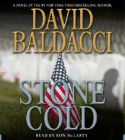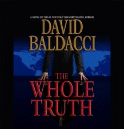|
 Finally, David Baldacci has sold 50 million copies of his novels in 35 languages and in 85 countries. These
include Absolute Power, Total Control, The Winner, The Simple Truth, Saving Faith, Wish You Well,
The Christmas Train, Split Second, The Camel Club, Simple Genius, and STONE COLD,
his new "Camel Club" novel featuring a character named Oliver Stone--a former CIA assassin who
tries to protect a con artist being hunted by the casino don she conned out of millions, and who killed her
mother. Narrated by Ron McLarty for Hachette Audio, the audiobook has garnered praise as a twisting plot
romp among various shadow agencies and governments. David's next novel, due out next month, is The
Whole Truth, and I spoke to him via phone about his writing, audiobooks in general, and McLarty
in particular.
Finally, David Baldacci has sold 50 million copies of his novels in 35 languages and in 85 countries. These
include Absolute Power, Total Control, The Winner, The Simple Truth, Saving Faith, Wish You Well,
The Christmas Train, Split Second, The Camel Club, Simple Genius, and STONE COLD,
his new "Camel Club" novel featuring a character named Oliver Stone--a former CIA assassin who
tries to protect a con artist being hunted by the casino don she conned out of millions, and who killed her
mother. Narrated by Ron McLarty for Hachette Audio, the audiobook has garnered praise as a twisting plot
romp among various shadow agencies and governments. David's next novel, due out next month, is The
Whole Truth, and I spoke to him via phone about his writing, audiobooks in general, and McLarty
in particular.
 JONATHAN LOWE: Mystery writer Dennis LeHane said that he starts with characters, sets them in
conflict, and lets them work out the plot. Do you start with an outline, yourself, and if so, which comes
first--the characters or the action?
JONATHAN LOWE: Mystery writer Dennis LeHane said that he starts with characters, sets them in
conflict, and lets them work out the plot. Do you start with an outline, yourself, and if so, which comes
first--the characters or the action?
David Baldacci: I've done it both ways. Had some novels where I've started with
characters, and built the plot around them. Other times I've come up with an interesting plot, and
constructed characters to inhabit that story. That said, you can have a great plot, but if the characters
are cardboard, and the reader doesn't care what happens to them, even the greatest plot in the world won't
hold their attention.
LOWE: How much of the writing is discovery for you, then, and do you know the ending when you
begin?
Baldacci: I hardly ever know the ending when I begin. I'm not smart enough to know everything
that's going to happen. Some writers have very elaborate outlines, and they don't deviate from that. It's
an evolutionary process for me. As I research a subject, new subplots and ideas occur to me. I may not know
what characters are capable of in the first hundred pages, and so this dictates future action.
LOWE: I know what you mean, although I also know some writers who start with the ending and work
backward, not knowing how they're going to get there. It's more fun not knowing, in any case, isn't it?
Baldacci: Oh, it is. I mean, I don't want to sit down and say, 'okay, today I'm going to be
writing section two, subparagraph nine...' (Laughs)
LOWE: I've read once that you like trains, and you wrote "The Christmas Train." What
trips have you taken on trains, and what inspired that book, specifically?
Baldacci: Well, I took a trip across the country which was documented in that book in a fictional
sense. The Capitol Limited, Washington to Chicago, then to L.A. on the Southwest Chief. You know, I grew up
reading the Sherlock Holmes, the Hercule Poirots, the Jane Marples of the world, and they used trains and
seemed mysterious and also enlightening. It's a great place to people watch. I've also taken trains in
Europe, across Italy, France, Germany. . . Most of the time I have to fly just because of the demands of
time, but love taking trains, and I've written so much on trains, just sitting in your compartment, the
lights flashing by, the darkness outside. It's the perfect atmosphere to write.
LOWE: I wonder if you've read "Strangers on a Train" by Patricia Highsmith, and what
other writers have influenced you.
Baldacci: I actually enjoy Patricia Highsmith's work. She is quite dark and compelling, and also
unpredictable. That type of genre appeals to me. I like mysteries that break outside the normal rules. Other
writers, John Irving, Anne Tyler, Eudora Welty, Flannery O'Connor, John Updike. Updike deals with many
generations of people, as does Irving. Any writer can be influential, depending on what you're reading them
for.
LOWE: How are the movie and TV projects coming along?
Baldacci: "Absolute Power" as a movie did very well. A couple other books have been in
development too. But it's tough, you've got seventy different factors out there competing.
LOWE: Screenwriting is very different from novel writing, isn't it?
Baldacci: It is. Different questions are asked, and there's a different discipline involved.
I've sold a number of screenplays, none produced yet, but I worked with producers at studios, where
everybody has input, you know, depending on what day it is, and what angle they want you to take. And so
you have to know your marks. I've sat in offices with six people on the other side, just firing questions.
And it helped me, in a way, because it made me think out things a little better. In a script, if you don't
think things out, at some point they start asking questions, and it becomes a long afternoon.
LOWE: Do you listen to your audiobooks, and what do you think of the medium?
Baldacci: I do, and it's an exploding medium. It's amazing, the number of audiobooks that are
sold now. For example, I've gone to Cracker Barrel, and seen the displays there, and I think it's a great
value-added thing for customers, because more and more people these days are popping them in their cars
while commuting. People don't want to carry books around, and would rather listen to them while they're
doing something else.
LOWE: Plus they don't have time.
Baldacci: Right, they really don't have time to sit down with a book, but if they can do
something else too, that's a great thing. Just looking at the numbers of my books, it's extraordinary the
increases over the years. I enjoy them. I remember first listening to Ron McLarty reading "Last Man
Standing," actually while on a train, and he's like this diminutive Irish character actor you see all
the time, but when he did the voice of this big villain, I couldn't believe it. It was like the guy was
right in the train with me! I wrote him a letter, and said, "my God, you just nailed that
character!" He did that voice so effectively.
LOWE: Some of his female characters are just uncanny, too. You start to wonder. . . there's gotta
be somebody else in the studio. . . some woman there doing this!
Baldacci: (Laughs) I know, it's talent. I certainly can't do it.
LOWE: Literacy is one of your charities. I'm wondering how much TV you let your kids watch, and
how parents can get their kids to read more.
Baldacci: Our kids don't watch much TV. We're very strict about that. No video games in our
house, just a computer where we let them go to specific sites while we're there. We read to each other
instead, and make it a family affair, even making up stories sometimes. Often we'll read a story, come to
the end, and I'll close the book and say, 'what did you think of that ending?' Then we'll discuss
alternative endings, and why an author did it the way he or she did. Kids want to be creative, use their
imaginations.
LOWE: And if you're just watching TV, everything is given to you, so you can't picture things in
your own mind.
Baldacci: Right, it's totally passive. I gave my daughter a journal, and told her she could
write anything she wanted in there, drawings included. And if she wants to show me anything, we'll discuss
it. Our kids are outside playing, too, coming up with things on their own, as opposed to just clicking on
a Game Boy. And what we're doing is paying off. Our kids are bright, imaginative, they play well, and come
up with interesting stuff. I'm convinced it's because they don't sit in front of the television.
|